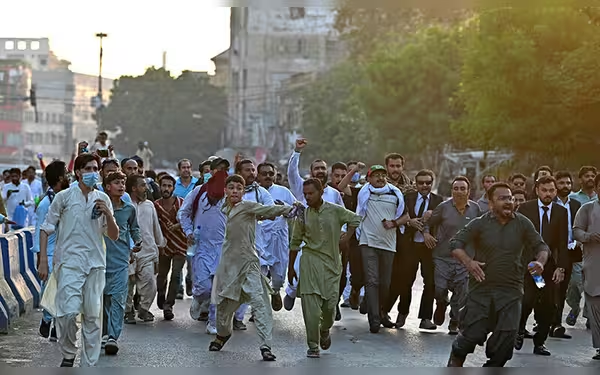Thursday, November 7, 2024 06:50 PM
PTI Workers Clash with Karachi Police During Section 144 Enforcement
- Clashes between PTI workers and police in Karachi.
- 35 individuals arrested, including Haleem Adil Sheikh.
- Section 144 imposed to maintain public order.
 Image Credits: dawn.com
Image Credits: dawn.comClashes in Karachi between PTI workers and police lead to 35 arrests amid Section 144 enforcement to maintain public order.
In a significant turn of events in Karachi, clashes erupted between Pakistan Tehreek-e-Insaf (PTI) workers and the police, leading to the enforcement of Section 144. This legal provision prohibits gatherings of more than four people in an area, aimed at maintaining public order. The situation escalated as both PTI supporters and members of a religious party took to the streets, defying the restrictions imposed by the authorities.
According to South Deputy Inspector General of Police (DIG) Syed Asad Raza, a total of 35 individuals were arrested during the confrontations. This included 15 PTI workers, among whom was the party's Sindh President, Haleem Adil Sheikh. The police action reflects the government's commitment to uphold law and order, especially in times of heightened political tension.
The enforcement of Section 144 is often a contentious issue in Pakistan, as it raises questions about the balance between maintaining public safety and allowing citizens the right to assemble and express their views. In this instance, the police justified their actions by citing the need to prevent potential violence and unrest.
As the political landscape in Pakistan continues to evolve, incidents like these highlight the challenges faced by law enforcement in managing public demonstrations. The arrests made during this clash serve as a reminder of the delicate nature of political discourse in the country, where differing opinions can quickly lead to conflict.
The recent clashes in Karachi underscore the importance of dialogue and peaceful protest in a democratic society. While the authorities must ensure public safety, it is equally vital for citizens to have the space to voice their concerns without fear of retribution. As Pakistan navigates its political future, fostering an environment of mutual respect and understanding will be crucial for the nation’s stability.













